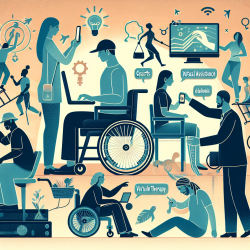Enhancing Skills in Managing Behavioral Disorders in Children with Intellectual Disability and Epilepsy
Managing children with intellectual disability (ID) and epilepsy can be a complex task, particularly when behavioral disorders are present. A recent report by the Intellectual Disability Task Force of the Neuropsychiatric Commission of ILAE, titled Behavioral disorder in people with an intellectual disability and epilepsy, provides critical insights that can aid practitioners in improving their skills and outcomes for this population. Here, we will explore key findings and practical recommendations from this research to help you enhance your practice.
Understanding the Epidemiology
The prevalence of epilepsy in individuals with ID is significantly higher than in the general population, with estimates around 22% compared to 0.80%. Behavioral disorders are also more common among children with both ID and epilepsy. Studies indicate varying prevalence rates, suggesting a complex relationship influenced by factors such as sample selection and diagnostic criteria. To address this, practitioners should advocate for standardized definitions and population-based studies to ensure comprehensive representation.
Identifying Etiological Factors
Key variables influencing behavioral disorders in this population include genetic causation, severity of ID, and the presence of autistic spectrum characteristics. Environmental factors, such as exposure to life events and reinforcement mechanisms, also play a significant role. When assessing etiology, it is crucial to consider these factors and their interplay with epilepsy-related variables like seizure frequency and antiepileptic drugs (AEDs).
Monitoring Behavioral Side Effects of AEDs
There is limited high-quality data on the behavioral effects of AEDs in individuals with ID and epilepsy. However, evidence suggests that AEDs can have both positive and negative behavioral impacts. For instance, levetiracetam has been associated with both improvements and exacerbations in behavior. Practitioners should closely monitor behavioral changes using validated assessment tools like the Adverse Event Profile (AEP) and the Aberrant Behavior Checklist (ABC).
Implementing Pharmacological Treatments
Given the challenges in including people with ID in randomized controlled trials, data on the effectiveness of psychotropic agents are scarce. Current clinical recommendations suggest that antipsychotics should be used cautiously and preferably in combination with psychological interventions. The emphasis should be on thorough assessment and short-term, monitored use of medications.
Considering Epilepsy Surgery
Intellectual disability is not a contraindication for epilepsy surgery. Studies indicate that epilepsy surgery can benefit cognitive and behavioral outcomes, especially in patients who achieve seizure freedom. Practitioners should ensure that patients with refractory epilepsy undergo presurgical evaluations and are informed about the potential benefits and uncertainties of surgery.
Applying Psychological Management Techniques
Psychological therapies, including cognitive behavioral therapy (CBT) and behavior modification, are effective in improving the quality of life for people with ID. Despite limited research on their efficacy in individuals with comorbid ID and epilepsy, CBT has shown promise in treating aggression and anger. A step-wise approach, including neuropsychological assessment and tailored interventions, is recommended.
Addressing Transition Challenges
Transitioning from pediatric to adult services is complex for individuals with ID, epilepsy, and behavioral disorders. Effective transition programs require collaboration between pediatric and adult services, with a focus on comprehensive care that addresses physical, cognitive, psychiatric, and behavioral needs. Early planning and involvement of key stakeholders are essential for successful transitions.
Supporting Family Caregivers
Families play a crucial role in the care of individuals with ID and epilepsy. However, they often face significant physical, social, and psychological burdens. Practitioners should recognize these challenges and advocate for interagency collaboration and practical supports such as respite care and access to information.
In conclusion, managing behavioral disorders in children with ID and epilepsy requires a multidisciplinary approach that includes thorough assessment, close monitoring of interventions, and support for family caregivers. By implementing the recommendations from the ILAE report, practitioners can improve outcomes and enhance the quality of life for these individuals.
To read the original research paper, please follow this link: Behavioral disorder in people with an intellectual disability and epilepsy: A report of the Intellectual Disability Task Force of the Neuropsychiatric Commission of ILAE.










